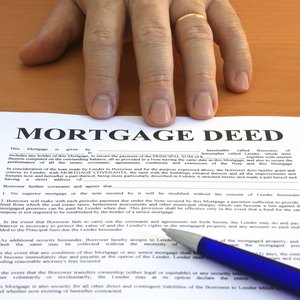
During a mortgage closing, you will sign a mortgage deed conveying ownership interest in the home to the lender and a promissory note stating that you will repay the loan according to the lender’s terms. The lender usually holds the promissory note until you repay the loan, unless there is a transfer or assignment of mortgage.
The mortgage deed could be in the possession of the lender or a title company and your attorney will have a copy, but in most cases there is also a record of it at the County Recorder’s office.
Contact Your Lender
The lender typically issues you a copy of all mortgage records at closing but if you cannot trace your mortgage deed or promissory note, contact your lender to get copies. Since the promissory note contains your promise to pay the lender the monthly mortgage payment including interest for a specific number of years, the lender usually retains custody.
However, if the lender transfers or assigns your mortgage to another lender, submit a written request to the new lender to obtain a copy of the promissory note.
Visit the Title Company
In the event that a title company handled the mortgage closing on behalf of the lender, the original mortgage deed is in the possession of the company and not the lender. Write a formal request or visit the offices of the title company with a copy of other relevant closing documents including your identification to access a copy of the mortgage deed and promissory note.
Ask Your Attorney
Alternatively, you can contact your attorney to get a copy of the documents. This option is only available if you retained your own attorney to draft the deed and handle the mortgage transaction on your behalf. Just like the title company, the attorney will have a copy of all the mortgage closing records.
Ideally, the records are in your file at the attorney’s office. However, if for some reason you cannot get in touch with your attorney or he lost his records through an unfortunate mishap such as a fire, you have another option.
Search the County Recorder
After closing a mortgage transaction, the lender or title company presents the mortgage documents for recording at the County Recorder’s office, which makes a copy and returns the original to the presenter. Most county recorder’s offices are now online, so you can search the database using your name, date of recording or type of document and request a copy of the mortgage deed.
Alternatively, you can visit the office, conduct a physical search and pay to get a copy certified in person or by mail. In some states, however, recording the promissory note is not legally required, so you cannot always get a copy of it at the office.
References
- Mortgage 101: What is a Mortgage Promissory Note?
- State of California Department of Consumer Affairs: Mortgage Loan Broker Compliance Evaluation Manual
- NOLO: What's the Difference Between a Mortgage and a Promissory Note?
- U.S. Securities and Exchange Commission. "Promissory Notes." Accessed Aug. 21, 2020.
- Sacramento County Public Law Library. "Real Property as Security for a Loan." Page 1. Accessed Aug. 21, 2020.
Writer Bio
William Dailey is well-versed on local and international affairs with sound financial, economic and business knowledge. He is an MBA and Business Administration graduate from the Kingston University and The London School of Business and Finance, respectively. William has been writing professionally since 2011.

